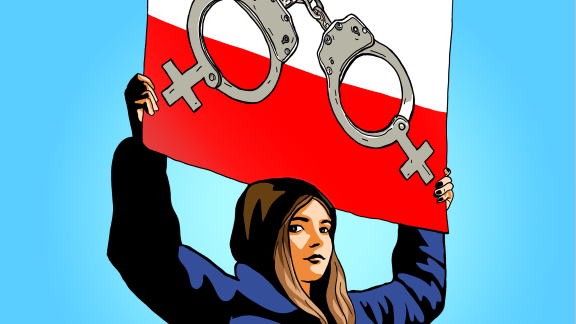26 January 2022 – One year after the ruling of Poland’s discredited Constitutional Tribunal banning access to abortion in almost all circumstances took effect, its devastating impact on the lives of women and all those in need of abortion care continues. The ruling has increased the extreme barriers women seeking access to abortion face and has had tragic consequences for many of them and their families.
Since the ruling took effect on 27 January 2021, more than 1000 women have turned to the European Court of Human Rights in an effort to vindicate their rights, challenging Poland’s highly restrictive abortion law and seeking justice. These groundbreaking cases mark the first direct challenges to be filed before the European Court against Poland’s abortion law and the 2020 Constitutional Tribunal ruling. The applicants claim that the Polish abortion law causes them grave harm and violates their rights to privacy and freedom from torture and other ill-treatment. The Court is expected to begin ruling on some of these cases: K.B. v. Poland and 3 other applications; K.C. v. Poland and 3 other applications; and A.L.- B. v. Poland and 3 other applications.
Nine leading international human rights organizations have filed third-party interventions to the European Court of Human Rights in these cases, including Amnesty International, the Center for Reproductive Rights, Human Rights Watch, the International Commission of Jurists (ICJ), the International Federation for Human Rights (FIDH), the International Planned Parenthood Federation European Network (IPPF EN), Women Enabled International, Women’s Link Worldwide, and the World Organisation Against Torture (OMCT). The interventions provide evidence and analysis drawing on international human rights law, comparative European law and guidelines from the World Health Organization. They outline the profound implications that highly restrictive abortion laws have on the lives and health of women and girls of reproductive age.
when
country
Poland
region
European Network
Subject
Abortion Care

Restrictive abortion laws such as Poland’s are contrary to international and European human rights standards and public health guidelines. They compromise women’s freedom, dignity, health, and lives. Our organizations’ interventions seek to highlight critical human rights aspects of such restrictive laws, and we are proud to support efforts to hold Poland accountable for these ongoing violations.

Background
Poland has one of Europe’s most restrictive abortion laws. Together with Malta, it is one of only two European Union Member States that has not legalized abortion on request or broad social grounds. In Poland, abortion is only permitted in situations of risk to the life or health of a pregnant woman, or if a pregnancy results from rape. In practice, however, it is almost impossible for those eligible for a legal abortion to obtain one. Every year thousands of women leave Poland to access abortion care in other European countries, while others import medical abortion pills or seek extra-legal abortion in Poland. Polish women, particularly those in difficult socio-economic situations, have to depend on the crucial help from civil society organizations, with often limited resources.
On 22 October 2020, Poland’s discredited Constitutional Tribunal ruled that abortion on grounds of “severe and irreversible fetal defect or incurable illness that threatens the fetus’ life” was unconstitutional. The ruling followed a case filed by members of the Polish Parliament and formally supported by the Prosecutor General. The ruling came into force on 27 January 2021. Both the European Court of Human Rights and the European Commission have found that the Constitutional Tribunal does not meet fair trial requirements due to its lack of independence from the legislative and the executive powers.
The ruling eliminated one of the only remaining legal grounds for abortion under Poland’s highly restrictive law and its entry into force means that there is now effectively a near-total ban on abortion in Poland. Previously, over 90 percent of the approximately 1,000 legal abortions annually performed in Poland were on this ground. The ruling came as the COVID-19 pandemic restrictions made travel for abortion care prohibitively difficult and costly. It spurred the country’s largest public protests in decades, led by women human rights defenders. Activists and women’s rights organizations report that the ruling is having a significant chilling effect as medical professionals fear repercussions even in situations where abortion remains legal. Women human rights defenders and civil society organizations advocating for the ruling to be overturned and for reform of Poland’s abortion law have faced threats of violence and several protestors have been prosecuted.
Read the third-party submissions here.
For more information about the cases filed by 12 Polish women see:
K.B. v. Poland and 3 other applications
K.C. v. Poland and 3 other applications
A.L.- B. v. Poland and 3 other applications
For more information on the developments following the Tribunal’s ruling see e.g.:
https://ec.europa.eu/commission/presscorner/detail/en/ip_21_7070
For more information, please contact:
For the International Planned Parenthood Federation European Network, Irene Donadio: [email protected], +32 491 71 93 90, Twitter: @ippfen











